
About the OT Program
OTD Program Mission Statement
The mission of the Doctor of Occupational Therapy program at Presbyterian College is to emulate the principles and values of the college, profession, and community to educate, mentor, and prepare skilled occupational therapists, servant leaders, and innovative researchers who promote evidence-based practice, advocacy, diversity, and scholarship.
OTD Program Vision Statement
To be integral in community and professional advancement through innovative excellence and leadership in education, clinical preparation, service, and scholarship:
The Doctor of Occupational Therapy program at Presbyterian College will effectively impact occupational therapy education through innovative, interprofessional, evidenced-based curriculum and teaching strategies that foster life-long learning, clinical excellence, ethical conduct, premier research, continued competence, and the fortitude to lead through service within our students, college, community, and profession.

OTD Program Educational Philosophy
The Occupational Therapy Doctoral Program at Presbyterian College fosters diverse, culturally sensitive and evidence-based clinical competence through active engagement in the collaborative process between student, client, community, and educator.
Occupational therapy is an art and science that involves the interrelationship of persons, occupations, and the contexts in which they function. Occupational therapy is “the therapeutic use of everyday life activities (occupations) with individuals or groups for the purpose of enhancing or enabling participation in roles, habits, and routines in home, school, workplace, community and other settings” (AOTA, 2014). Occupational therapists focus on improving performance in all areas of occupation to facilitate health and promote growth, change, and/or adaptation to achieve health, well-being, and participation in life through engagement in occupation (AOTA, 2014).
Our profession, community, and institution share the program’s commitment to client-centered, meaningful occupation to promote health through:
- Active, engaging, diverse, and inclusive learning within and beyond the classroom environment
- A collaborative process that builds on prior knowledge and experience
- Continuous professional judgment, evaluation, and self-reflection
- Lifelong learning and continuous advocacy for the profession and society’s occupational needs. (AOTA, 2018)
Graduation Requirements
The PC OTD program duration is 33 months/8 semesters (113 credits) of didactic/experiential courses (83 credits), clinical education/fieldwork (28 credits) and required programmatic competency (2 credits).
-
OTD students must demonstrate consistent academic commitment/performance; evident by accomplishing a minimum GPA of 3.0 and individual course grades of a C (70.00%+).
-
OTD students must complete all clinical education experiences/courses (fieldwork level I & II) with a grade of Pass (P).
-
All courses, including fieldwork and capstone components, must be completed within a maximum time frame of 150% of the length of the program in years (4.5 years).
-
Students must be in good standing in character, conduct, and ability as described in the college and program/fieldwork policies/handbooks.
-
Students must have met all financial obligations to the university.
Student Outcomes
The Occupational Therapy Doctoral Program at Presbyterian College held the graduation ceremony for its inaugural cohort in August 2023. Thirteen students completed the program and earned their doctorates in Occupational Therapy. The three-year graduation rate for the first cohort was 87% and 100% for the second cohort.
Student Outcomes
| Therapy Doctoral (OTD) program during the 3-year period of 2023-2025. | |||
| Graduation Year | Students Entering/Graduating | Graduation Rate | |
| 2023 | 15 / 13 | 87% | |
| 2024 | 21 / 21 | 100% | |
| 2025 | 18 / TBD | TBD | |
| Total | 54 / TBD | TBD | |
Commencement
The Doctor of Occupational Therapy Degree will be conferred upon graduates during the annual Presbyterian College commencement celebration/events in May. The actual degree will be mailed out following successful completion of the 14-week Doctoral Experiential Component (DEC) and evidence that all financial obligations have been fulfilled.
